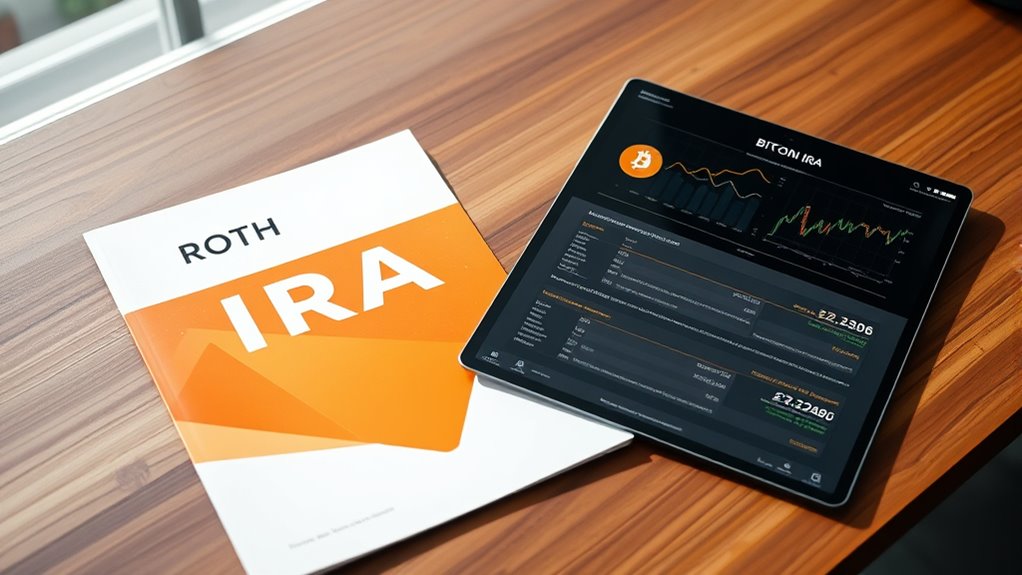Choosing between a Roth and a Traditional Bitcoin IRA depends on your current and future tax situation. If you expect to be in a higher tax bracket in retirement, a Roth IRA could save you more since withdrawals are tax-free. Conversely, if you want immediate tax savings and expect lower income later, a Traditional IRA might be better. To discover which option helps your tax savings grow the most over time, explore the details further.
Key Takeaways
- Roth Bitcoin IRA offers tax-free growth and withdrawals, potentially saving more on taxes if you expect higher income in retirement.
- Traditional Bitcoin IRA provides immediate tax deductions, which can be beneficial if you want to reduce taxable income now.
- Roth IRAs are advantageous if you anticipate being in a higher tax bracket during retirement, maximizing tax savings on growth.
- Traditional IRAs may save you more on taxes upfront, especially if current income is high and future income is expected to be lower.
- Your current tax situation and retirement income expectations determine which IRA type could result in greater overall tax savings.

Choosing between a Roth and a Traditional Bitcoin IRA can substantially impact your long-term investment strategy. As you plan for retirement, understanding how each option affects your taxes and growth potential is essential. Both types of IRAs serve as powerful tools for retirement planning, but they differ markedly in their tax treatment and how they fit into your overall investment strategies. Your decision hinges on your current financial situation, expected future income, and how you want to manage your tax liabilities over time.
A Traditional Bitcoin IRA allows you to contribute pre-tax dollars, which reduces your taxable income in the year you make the contribution. This can be advantageous if you’re currently in a higher tax bracket and want immediate tax relief. The account grows tax-deferred, meaning you won’t pay taxes on gains until you start making withdrawals during retirement. When you do withdraw, those distributions are taxed as ordinary income. This setup can be beneficial if you anticipate being in a lower tax bracket in retirement, as you’ll pay less on those withdrawals than you would have on the original contributions. For retirement planning, a Traditional IRA can provide immediate savings and help you maximize your investment strategies by allowing more capital to grow over time.
On the other hand, a Roth Bitcoin IRA involves contributions made with after-tax dollars. This means you pay taxes on your contributions upfront, but your investments grow tax-free. When you reach retirement age, qualified withdrawals are completely tax-free, including all gains and earnings. This feature makes the Roth especially appealing if you expect to be in the same or higher tax bracket when you retire. If your goal is to minimize taxes in retirement and you believe your investments will grow markedly, a Roth IRA could save you more in the long run. It also offers flexibility since you can withdraw your contributions at any time without penalty or taxes, giving you more liquidity options during your working years. Additionally, integrating a high-quality home theatre projector might not be directly related but shows how diversifying your investments can include entertainment assets to enhance your lifestyle.
Deciding between these two options ultimately depends on your current income, your expectations for future earnings, and your overall retirement strategies. If you prefer immediate tax deductions and believe your tax rate will be lower in retirement, a Traditional IRA might be the better choice. Conversely, if you’re confident your income and investments will grow substantially and want tax-free income later, a Roth could be more advantageous. Both options require careful consideration of your financial goals and the potential tax implications over time. Whichever route you choose, integrating a Bitcoin IRA into your retirement planning can diversify your investment strategies and help secure your financial future.
Frequently Asked Questions
Can I Convert a Traditional Bitcoin IRA to a Roth Later?
You can convert a traditional Bitcoin IRA to a Roth later through a process called a Roth conversion. This gives you conversion options, but be aware of the tax implications—your converted amount will be taxed as income in the year of the transfer. Planning ahead helps you manage potential tax bills, making the switch more beneficial. Always consult a financial advisor to navigate these decisions effectively.
Are There Income Limits for Contributing to a Roth Bitcoin IRA?
You should know that there are income limits that affect your ability to contribute to a Roth Bitcoin IRA. If your income exceeds certain thresholds, you might face contribution rules that restrict or disallow direct contributions. These limits are designed to phase out high earners from Roth contributions. It’s important to check current IRS guidelines, as income limits and contribution rules can change annually, influencing how much you can contribute.
What Are the Penalties for Early Withdrawal From a Bitcoin IRA?
Imagine you’re in the Wild West of retirement savings. If you withdraw early from your Bitcoin IRA, you’ll face hefty penalties—usually 10% plus income taxes. However, penalty exceptions exist for specific withdrawal timing, like disability or first-time home purchase. Be cautious, as early withdrawals can derail your plans; understanding these penalties and exceptions helps you avoid costly surprises and keeps your retirement journey on track.
How Does Bitcoin’s Volatility Affect Tax Advantages in IRAS?
Market volatility in Bitcoin can impact your IRA’s tax advantages by influencing when you sell. If prices swing wildly, you might face higher taxes if you sell during a peak, or miss gains if you hold through dips. Careful tax timing matters; by managing when you realize gains or losses, you can optimize your tax benefits despite Bitcoin’s inherent volatility. Planning your sales around market trends helps maximize your IRA’s tax advantages.
Can I Hold Other Cryptocurrencies in a Bitcoin IRA?
You can hold other cryptocurrencies in a Bitcoin IRA, but it depends on your IRA’s custodial options. Many custodians offer cryptocurrency diversification, allowing you to include various digital assets beyond Bitcoin. Always check with your IRA provider to confirm they support the specific cryptocurrencies you’re interested in. This way, you can build a diversified crypto portfolio within your IRA, maximizing potential growth and aligning with your investment goals.
Conclusion
Choosing between a Roth and Traditional Bitcoin IRA isn’t just about taxes; it’s about your future financial freedom. With a Roth, you pay taxes now and enjoy tax-free growth, while a Traditional allows upfront tax breaks but taxes your gains later. It’s a trade-off—pay now or later. Think about your current tax situation and future goals. Whichever you choose, make sure it aligns with your overall strategy, because your financial freedom depends on it.










